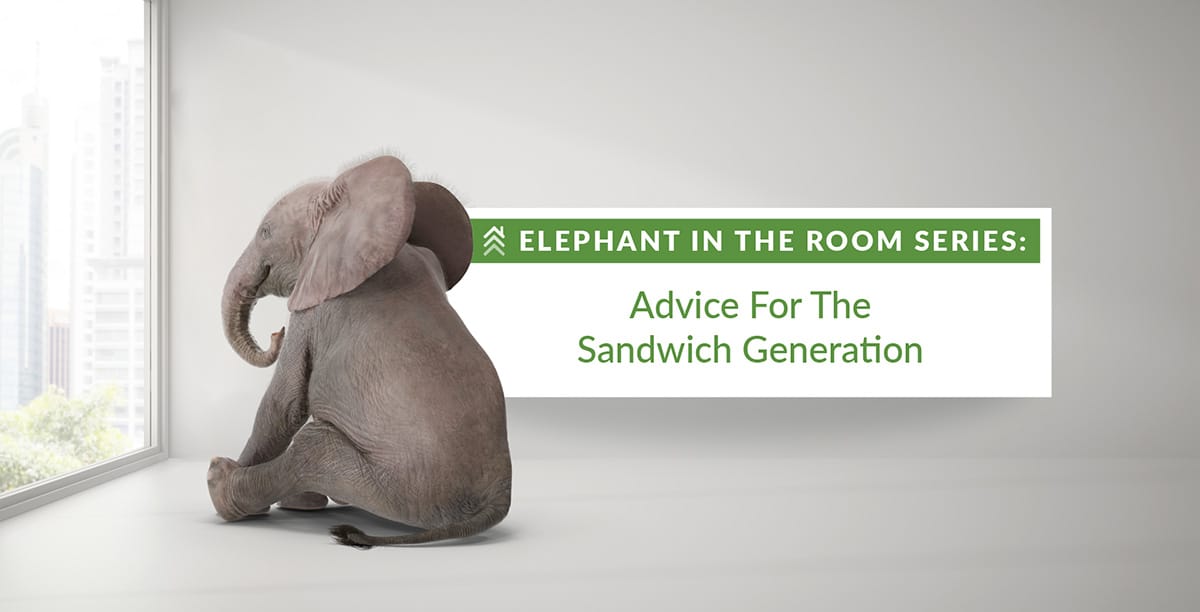
August is National Sandwich Month! Before you imagine a thick slice of bacon and a garden-fresh tomato on a BLT, the sandwich fillings we’re referring to are a group of folks who are “sandwiched” into being caregivers for both their children and their aging parents – they’re known as “The Sandwich Generation.”
Taking care of others can be rewarding, but it can also be overwhelming, which can create caregiver burnout, financial burdens, and emotional strain. If you are a family caregiver, remember to reach out to others for help and take time for yourself.
Find Senior Living Near Me
As a fellow “sandwich generationer,” I wanted to share my experience with caregiving and offer some friendly advice. Fix yourself a well-deserved sandwich and enjoy the read!
How it Started:
My dad was living alone, and he received a diagnosis of dementia. We decided to move him in with my two kids and me. I thought it would be a wonderful opportunity to bring the generations together and for my children to learn from my dad’s stories and experiences.
In the beginning, things were great. But as my dad’s needs changed and my children’s lives got busier, caregiving became difficult.
I had a full-time job keeping my dad safe once his dementia progressed. His appetite and thirst diminished. I had to take him to the ER frequently to receive fluids for dehydration. He didn’t like to take his medications, which impacted his sleep. I spent nights on the couch to make sure he didn’t leave the safety of our home in the middle of the night. I felt like our roles had reversed.
While so much of my time was spent helping my dad, my kids were frustrated with me because I couldn’t attend their sporting events or take them places. They didn’t know how guilty and tired I felt all the time. If I gave my time to them, I didn’t give my time to my dad, and vice versa.
I thought I could do it all, but after a trip to my doctor, I got a wake-up call. My blood pressure was up, and I was exhausted. After I explained what was happening in my home life, she said I was suffering from caregiver strain. She suggested that I join a caregiver support group.
What We Decided to Do:
After learning from those in my support group, I knew I didn’t want to risk anyone’s health and safety. We chose to help my dad move into a memory care community. Initially, I felt immense guilt because we swore we’d never “put him in a home.” The truth is, when you find the right community, they offer far more than somewhere to call home.
Assisted living and memory care communities have evolved from a place to merely exist, to a comfortable and private home setting where your loved ones can thrive! The communities nowadays offer so many amenities on-site that it’s easy for elders to stay active, healthy, and happy.
How It’s Going:
Dad is doing so well in his memory care community. While dementia has impacted him, he’s living in a wonderful place where the staff helps him shine! The people and all of the activities make him so happy. He loves the food, and never has to eat alone!
I have gone from being a caregiver back to a daughter again. I no longer have to worry if he’s eating, showering, or getting his medications. The peace of mind I have knowing he’s in good hands made me wish we didn’t wait so long.
Friendly Advice:
Talk to your parents. Ask what their wishes are, and please consider doing it early. These conversations are not easy, but just like advance directives help guide healthcare decisions, ask what their wishes are for their long-term care needs.
Take some tours of senior living communities before they’re needed. You can even be strategic about it if the conversation seems uncomfortable. For instance, if they have a friend residing in an assisted living community, suggest a visit, and while you do, ask questions. Seeing communities in person is an opportunity to learn what they’re all about versus what someone might think.
Remember that senior living communities have changed. Look for a community setting with a variety of services. Aside from a busy activities calendar, one of the best perks is on-site healthcare. With preventative care and health monitoring, your loved one will feel better. Better health opens the door to a better quality of life. The time, money, and energy saved by on-site healthcare services are added perks that may not be listed on a brochure.
Use the resources in your community. When they start planning, most people don’t know what’s available.
Here’s a list of helpful providers and community organizations:
- Local Aging and Disability Resource Centers
- Medicaid
- The U.S. Department of Veterans Affairs “VA”
- Adopt a grandparent
- Senior meal sites/meals on wheels in your area
- Home care/personal care/companion care providers
- Home health services from a nurse or physical therapist
- Public transportation programs for seniors
- Emergency alert pendants (a call button to dispatch emergency help)
- Medication packing services from local pharmacies
- Adult day services
- Short-term or respite care services
- Local caregiver support groups
- The Alzheimer’s Association (ALZ.org or 24-hour hotline, 800-272-3900)
There are a variety of resources listed above that may provide some short-term relief. Even a little help or a break might allow you more energy and time to find answers for the future.
If you’re considering senior living and want to learn more, let Edgewood Healthcare help! We have many services that can restore time, joy, and peace of mind to your family. Find a community near you, or contact us today at info@edgewoodhealthcare.com.




